LAWS20059: Partnership, Corporation & Director Duties Analysis
VerifiedAdded on 2023/06/10
|13
|3505
|468
Case Study
AI Summary
This assignment provides a comprehensive analysis of partnership and corporation business structures in Australia, referencing relevant legislation and case law such as Salomon v Salomon & Co Ltd and ASIC v Adler. It evaluates the advantages and disadvantages of each structure, considering factors like liability, capital raising, and decision-making processes. The study recommends a corporation structure for the given case study, highlighting the benefits of limited liability and increased growth opportunities. Additionally, it examines the duties of directors under the Corporations Act, emphasizing the importance of care, diligence, and good faith, using the ASIC v Adler case to illustrate the consequences of breaching these duties. Desklib offers a platform for students to access this and other solved assignments.

0
Student Name
Student Number
Word count:
Part 1:
Part 2:
Part 3:
Student Name
Student Number
Word count:
Part 1:
Part 2:
Part 3:
Paraphrase This Document
Need a fresh take? Get an instant paraphrase of this document with our AI Paraphraser
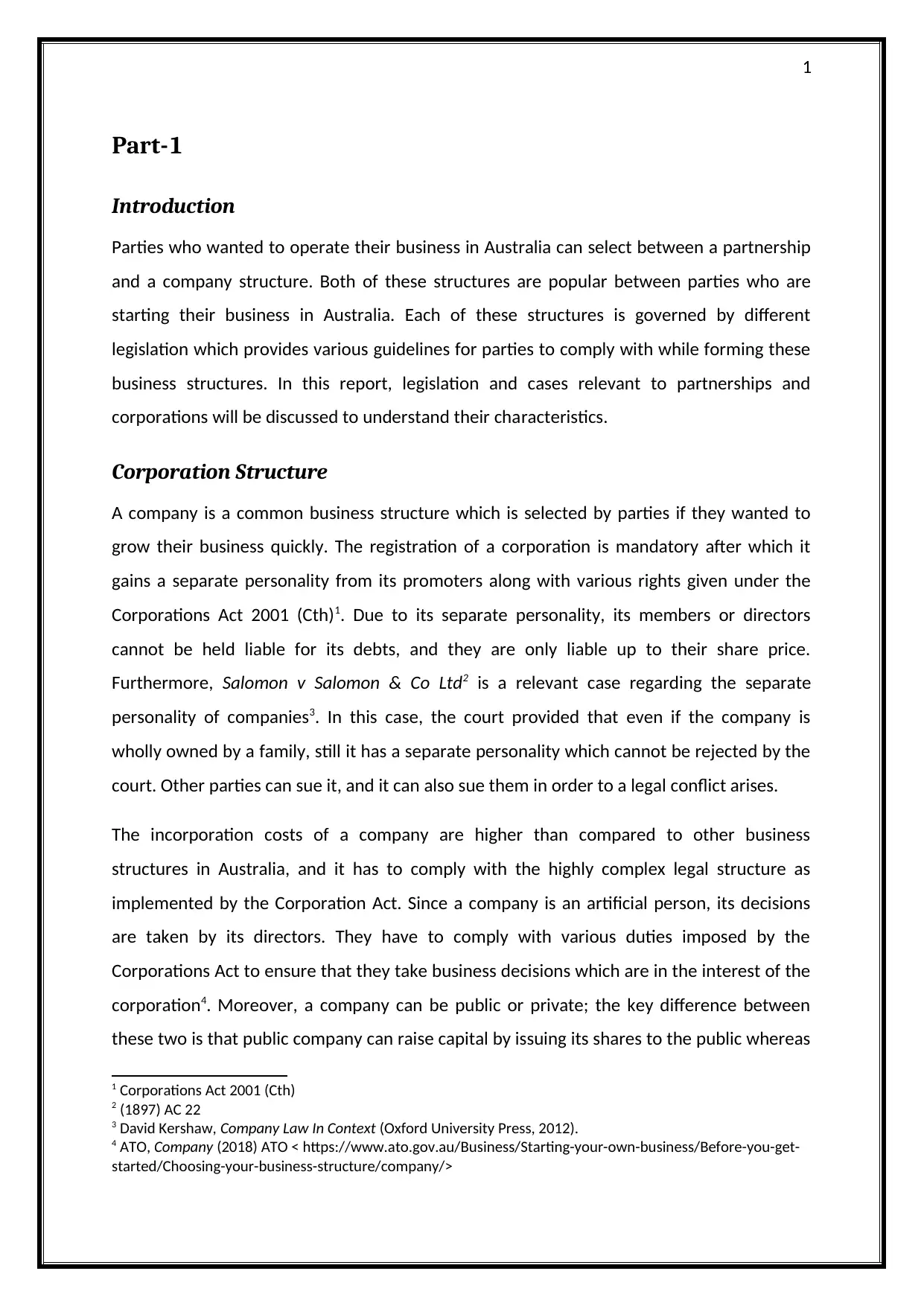
1
Part-1
Introduction
Parties who wanted to operate their business in Australia can select between a partnership
and a company structure. Both of these structures are popular between parties who are
starting their business in Australia. Each of these structures is governed by different
legislation which provides various guidelines for parties to comply with while forming these
business structures. In this report, legislation and cases relevant to partnerships and
corporations will be discussed to understand their characteristics.
Corporation Structure
A company is a common business structure which is selected by parties if they wanted to
grow their business quickly. The registration of a corporation is mandatory after which it
gains a separate personality from its promoters along with various rights given under the
Corporations Act 2001 (Cth)1. Due to its separate personality, its members or directors
cannot be held liable for its debts, and they are only liable up to their share price.
Furthermore, Salomon v Salomon & Co Ltd2 is a relevant case regarding the separate
personality of companies3. In this case, the court provided that even if the company is
wholly owned by a family, still it has a separate personality which cannot be rejected by the
court. Other parties can sue it, and it can also sue them in order to a legal conflict arises.
The incorporation costs of a company are higher than compared to other business
structures in Australia, and it has to comply with the highly complex legal structure as
implemented by the Corporation Act. Since a company is an artificial person, its decisions
are taken by its directors. They have to comply with various duties imposed by the
Corporations Act to ensure that they take business decisions which are in the interest of the
corporation4. Moreover, a company can be public or private; the key difference between
these two is that public company can raise capital by issuing its shares to the public whereas
1 Corporations Act 2001 (Cth)
2 (1897) AC 22
3 David Kershaw, Company Law In Context (Oxford University Press, 2012).
4 ATO, Company (2018) ATO < https://www.ato.gov.au/Business/Starting-your-own-business/Before-you-get-
started/Choosing-your-business-structure/company/>
Part-1
Introduction
Parties who wanted to operate their business in Australia can select between a partnership
and a company structure. Both of these structures are popular between parties who are
starting their business in Australia. Each of these structures is governed by different
legislation which provides various guidelines for parties to comply with while forming these
business structures. In this report, legislation and cases relevant to partnerships and
corporations will be discussed to understand their characteristics.
Corporation Structure
A company is a common business structure which is selected by parties if they wanted to
grow their business quickly. The registration of a corporation is mandatory after which it
gains a separate personality from its promoters along with various rights given under the
Corporations Act 2001 (Cth)1. Due to its separate personality, its members or directors
cannot be held liable for its debts, and they are only liable up to their share price.
Furthermore, Salomon v Salomon & Co Ltd2 is a relevant case regarding the separate
personality of companies3. In this case, the court provided that even if the company is
wholly owned by a family, still it has a separate personality which cannot be rejected by the
court. Other parties can sue it, and it can also sue them in order to a legal conflict arises.
The incorporation costs of a company are higher than compared to other business
structures in Australia, and it has to comply with the highly complex legal structure as
implemented by the Corporation Act. Since a company is an artificial person, its decisions
are taken by its directors. They have to comply with various duties imposed by the
Corporations Act to ensure that they take business decisions which are in the interest of the
corporation4. Moreover, a company can be public or private; the key difference between
these two is that public company can raise capital by issuing its shares to the public whereas
1 Corporations Act 2001 (Cth)
2 (1897) AC 22
3 David Kershaw, Company Law In Context (Oxford University Press, 2012).
4 ATO, Company (2018) ATO < https://www.ato.gov.au/Business/Starting-your-own-business/Before-you-get-
started/Choosing-your-business-structure/company/>
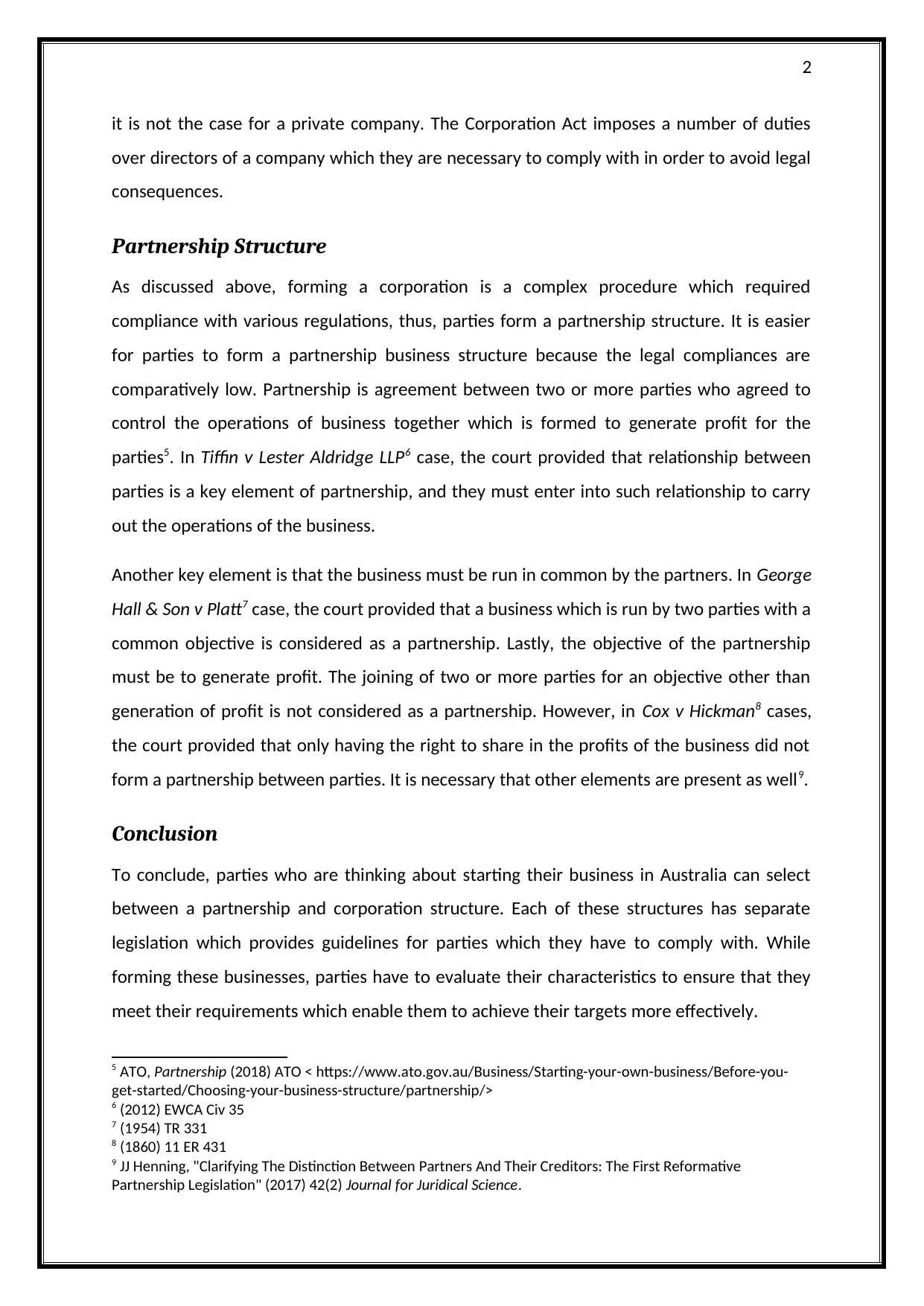
2
it is not the case for a private company. The Corporation Act imposes a number of duties
over directors of a company which they are necessary to comply with in order to avoid legal
consequences.
Partnership Structure
As discussed above, forming a corporation is a complex procedure which required
compliance with various regulations, thus, parties form a partnership structure. It is easier
for parties to form a partnership business structure because the legal compliances are
comparatively low. Partnership is agreement between two or more parties who agreed to
control the operations of business together which is formed to generate profit for the
parties5. In Tiffin v Lester Aldridge LLP6 case, the court provided that relationship between
parties is a key element of partnership, and they must enter into such relationship to carry
out the operations of the business.
Another key element is that the business must be run in common by the partners. In George
Hall & Son v Platt7 case, the court provided that a business which is run by two parties with a
common objective is considered as a partnership. Lastly, the objective of the partnership
must be to generate profit. The joining of two or more parties for an objective other than
generation of profit is not considered as a partnership. However, in Cox v Hickman8 cases,
the court provided that only having the right to share in the profits of the business did not
form a partnership between parties. It is necessary that other elements are present as well9.
Conclusion
To conclude, parties who are thinking about starting their business in Australia can select
between a partnership and corporation structure. Each of these structures has separate
legislation which provides guidelines for parties which they have to comply with. While
forming these businesses, parties have to evaluate their characteristics to ensure that they
meet their requirements which enable them to achieve their targets more effectively.
5 ATO, Partnership (2018) ATO < https://www.ato.gov.au/Business/Starting-your-own-business/Before-you-
get-started/Choosing-your-business-structure/partnership/>
6 (2012) EWCA Civ 35
7 (1954) TR 331
8 (1860) 11 ER 431
9 JJ Henning, "Clarifying The Distinction Between Partners And Their Creditors: The First Reformative
Partnership Legislation" (2017) 42(2) Journal for Juridical Science.
it is not the case for a private company. The Corporation Act imposes a number of duties
over directors of a company which they are necessary to comply with in order to avoid legal
consequences.
Partnership Structure
As discussed above, forming a corporation is a complex procedure which required
compliance with various regulations, thus, parties form a partnership structure. It is easier
for parties to form a partnership business structure because the legal compliances are
comparatively low. Partnership is agreement between two or more parties who agreed to
control the operations of business together which is formed to generate profit for the
parties5. In Tiffin v Lester Aldridge LLP6 case, the court provided that relationship between
parties is a key element of partnership, and they must enter into such relationship to carry
out the operations of the business.
Another key element is that the business must be run in common by the partners. In George
Hall & Son v Platt7 case, the court provided that a business which is run by two parties with a
common objective is considered as a partnership. Lastly, the objective of the partnership
must be to generate profit. The joining of two or more parties for an objective other than
generation of profit is not considered as a partnership. However, in Cox v Hickman8 cases,
the court provided that only having the right to share in the profits of the business did not
form a partnership between parties. It is necessary that other elements are present as well9.
Conclusion
To conclude, parties who are thinking about starting their business in Australia can select
between a partnership and corporation structure. Each of these structures has separate
legislation which provides guidelines for parties which they have to comply with. While
forming these businesses, parties have to evaluate their characteristics to ensure that they
meet their requirements which enable them to achieve their targets more effectively.
5 ATO, Partnership (2018) ATO < https://www.ato.gov.au/Business/Starting-your-own-business/Before-you-
get-started/Choosing-your-business-structure/partnership/>
6 (2012) EWCA Civ 35
7 (1954) TR 331
8 (1860) 11 ER 431
9 JJ Henning, "Clarifying The Distinction Between Partners And Their Creditors: The First Reformative
Partnership Legislation" (2017) 42(2) Journal for Juridical Science.
⊘ This is a preview!⊘
Do you want full access?
Subscribe today to unlock all pages.

Trusted by 1+ million students worldwide

3
Paraphrase This Document
Need a fresh take? Get an instant paraphrase of this document with our AI Paraphraser
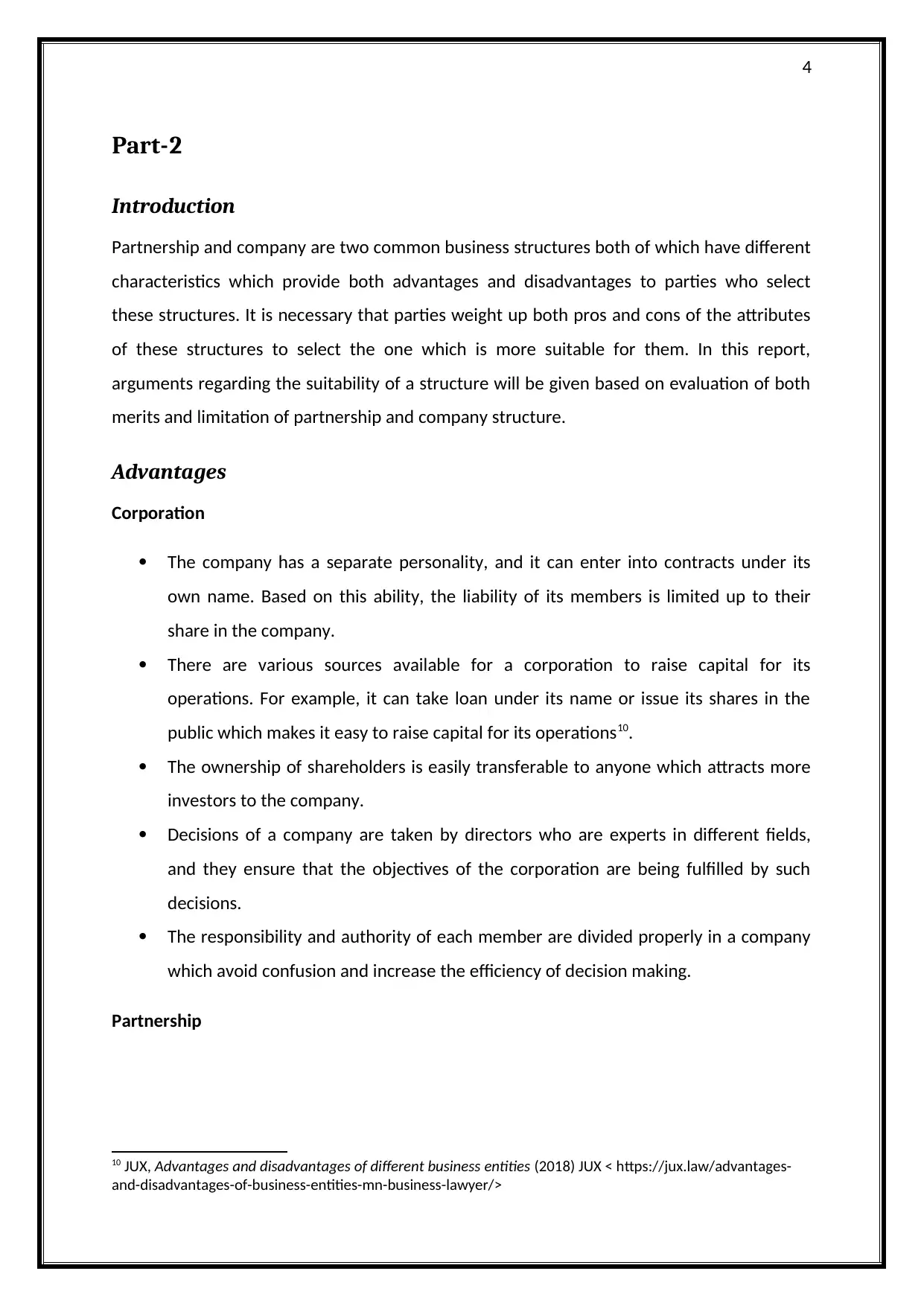
4
Part-2
Introduction
Partnership and company are two common business structures both of which have different
characteristics which provide both advantages and disadvantages to parties who select
these structures. It is necessary that parties weight up both pros and cons of the attributes
of these structures to select the one which is more suitable for them. In this report,
arguments regarding the suitability of a structure will be given based on evaluation of both
merits and limitation of partnership and company structure.
Advantages
Corporation
The company has a separate personality, and it can enter into contracts under its
own name. Based on this ability, the liability of its members is limited up to their
share in the company.
There are various sources available for a corporation to raise capital for its
operations. For example, it can take loan under its name or issue its shares in the
public which makes it easy to raise capital for its operations10.
The ownership of shareholders is easily transferable to anyone which attracts more
investors to the company.
Decisions of a company are taken by directors who are experts in different fields,
and they ensure that the objectives of the corporation are being fulfilled by such
decisions.
The responsibility and authority of each member are divided properly in a company
which avoid confusion and increase the efficiency of decision making.
Partnership
10 JUX, Advantages and disadvantages of different business entities (2018) JUX < https://jux.law/advantages-
and-disadvantages-of-business-entities-mn-business-lawyer/>
Part-2
Introduction
Partnership and company are two common business structures both of which have different
characteristics which provide both advantages and disadvantages to parties who select
these structures. It is necessary that parties weight up both pros and cons of the attributes
of these structures to select the one which is more suitable for them. In this report,
arguments regarding the suitability of a structure will be given based on evaluation of both
merits and limitation of partnership and company structure.
Advantages
Corporation
The company has a separate personality, and it can enter into contracts under its
own name. Based on this ability, the liability of its members is limited up to their
share in the company.
There are various sources available for a corporation to raise capital for its
operations. For example, it can take loan under its name or issue its shares in the
public which makes it easy to raise capital for its operations10.
The ownership of shareholders is easily transferable to anyone which attracts more
investors to the company.
Decisions of a company are taken by directors who are experts in different fields,
and they ensure that the objectives of the corporation are being fulfilled by such
decisions.
The responsibility and authority of each member are divided properly in a company
which avoid confusion and increase the efficiency of decision making.
Partnership
10 JUX, Advantages and disadvantages of different business entities (2018) JUX < https://jux.law/advantages-
and-disadvantages-of-business-entities-mn-business-lawyer/>
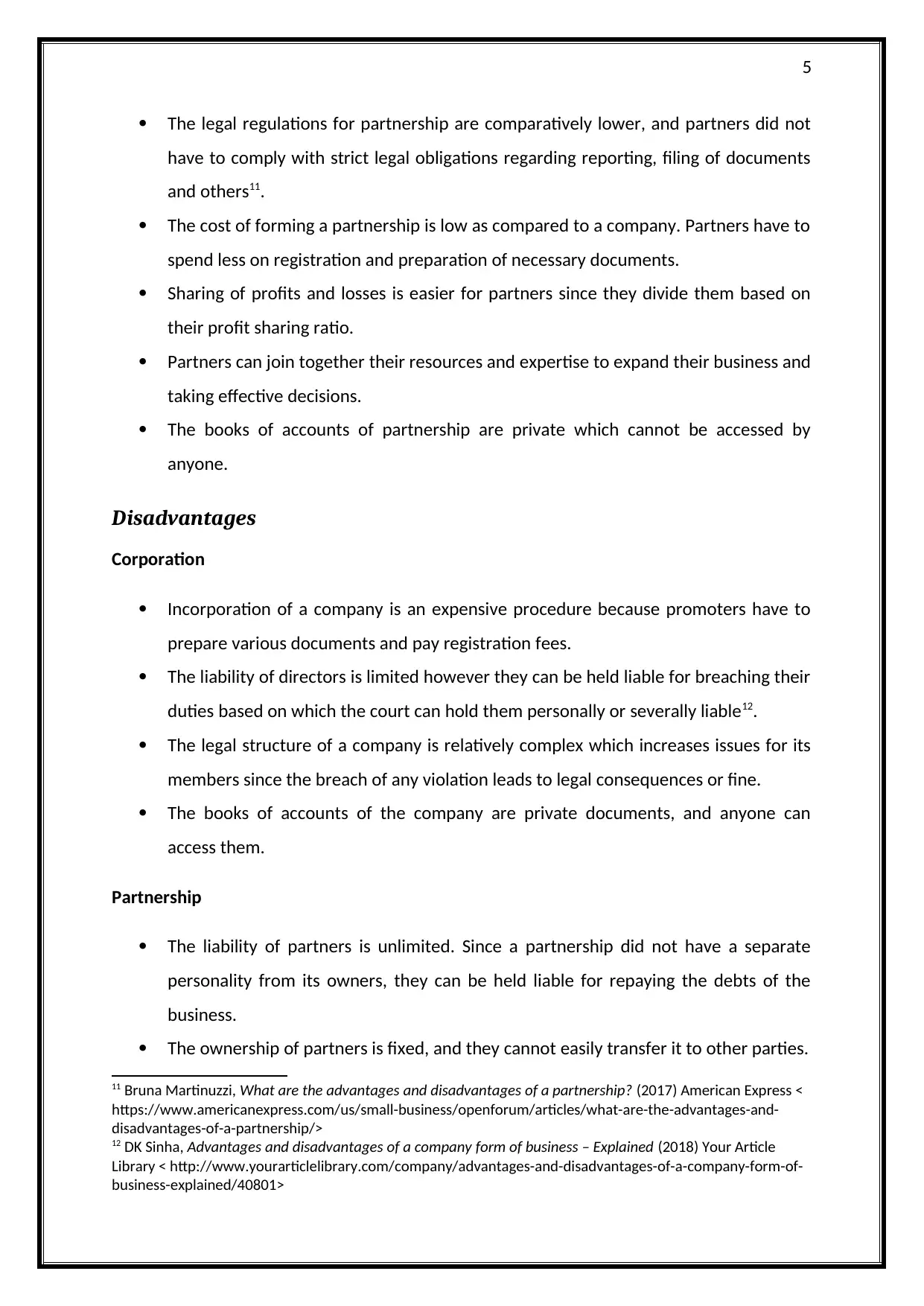
5
The legal regulations for partnership are comparatively lower, and partners did not
have to comply with strict legal obligations regarding reporting, filing of documents
and others11.
The cost of forming a partnership is low as compared to a company. Partners have to
spend less on registration and preparation of necessary documents.
Sharing of profits and losses is easier for partners since they divide them based on
their profit sharing ratio.
Partners can join together their resources and expertise to expand their business and
taking effective decisions.
The books of accounts of partnership are private which cannot be accessed by
anyone.
Disadvantages
Corporation
Incorporation of a company is an expensive procedure because promoters have to
prepare various documents and pay registration fees.
The liability of directors is limited however they can be held liable for breaching their
duties based on which the court can hold them personally or severally liable12.
The legal structure of a company is relatively complex which increases issues for its
members since the breach of any violation leads to legal consequences or fine.
The books of accounts of the company are private documents, and anyone can
access them.
Partnership
The liability of partners is unlimited. Since a partnership did not have a separate
personality from its owners, they can be held liable for repaying the debts of the
business.
The ownership of partners is fixed, and they cannot easily transfer it to other parties.
11 Bruna Martinuzzi, What are the advantages and disadvantages of a partnership? (2017) American Express <
https://www.americanexpress.com/us/small-business/openforum/articles/what-are-the-advantages-and-
disadvantages-of-a-partnership/>
12 DK Sinha, Advantages and disadvantages of a company form of business – Explained (2018) Your Article
Library < http://www.yourarticlelibrary.com/company/advantages-and-disadvantages-of-a-company-form-of-
business-explained/40801>
The legal regulations for partnership are comparatively lower, and partners did not
have to comply with strict legal obligations regarding reporting, filing of documents
and others11.
The cost of forming a partnership is low as compared to a company. Partners have to
spend less on registration and preparation of necessary documents.
Sharing of profits and losses is easier for partners since they divide them based on
their profit sharing ratio.
Partners can join together their resources and expertise to expand their business and
taking effective decisions.
The books of accounts of partnership are private which cannot be accessed by
anyone.
Disadvantages
Corporation
Incorporation of a company is an expensive procedure because promoters have to
prepare various documents and pay registration fees.
The liability of directors is limited however they can be held liable for breaching their
duties based on which the court can hold them personally or severally liable12.
The legal structure of a company is relatively complex which increases issues for its
members since the breach of any violation leads to legal consequences or fine.
The books of accounts of the company are private documents, and anyone can
access them.
Partnership
The liability of partners is unlimited. Since a partnership did not have a separate
personality from its owners, they can be held liable for repaying the debts of the
business.
The ownership of partners is fixed, and they cannot easily transfer it to other parties.
11 Bruna Martinuzzi, What are the advantages and disadvantages of a partnership? (2017) American Express <
https://www.americanexpress.com/us/small-business/openforum/articles/what-are-the-advantages-and-
disadvantages-of-a-partnership/>
12 DK Sinha, Advantages and disadvantages of a company form of business – Explained (2018) Your Article
Library < http://www.yourarticlelibrary.com/company/advantages-and-disadvantages-of-a-company-form-of-
business-explained/40801>
⊘ This is a preview!⊘
Do you want full access?
Subscribe today to unlock all pages.

Trusted by 1+ million students worldwide
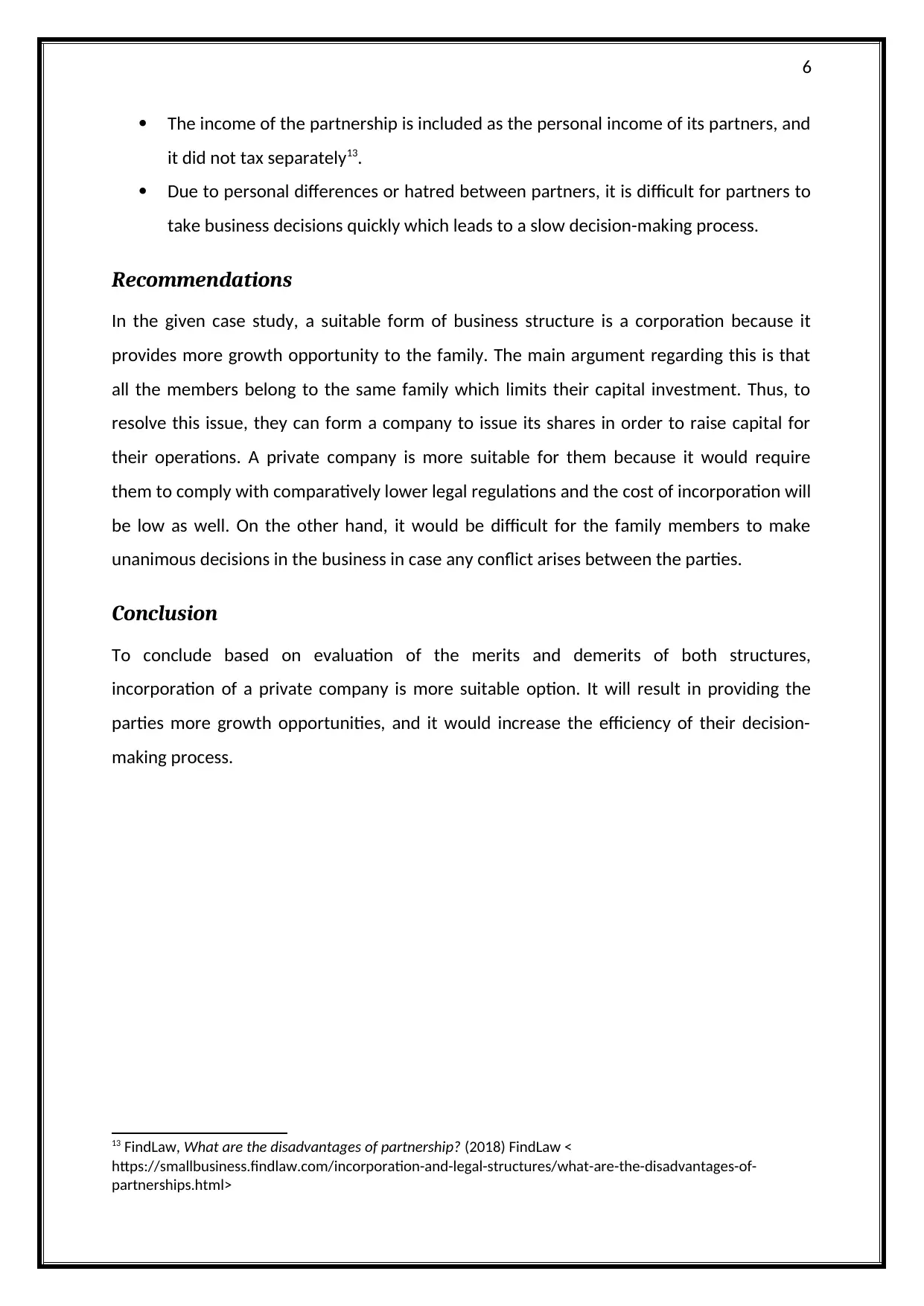
6
The income of the partnership is included as the personal income of its partners, and
it did not tax separately13.
Due to personal differences or hatred between partners, it is difficult for partners to
take business decisions quickly which leads to a slow decision-making process.
Recommendations
In the given case study, a suitable form of business structure is a corporation because it
provides more growth opportunity to the family. The main argument regarding this is that
all the members belong to the same family which limits their capital investment. Thus, to
resolve this issue, they can form a company to issue its shares in order to raise capital for
their operations. A private company is more suitable for them because it would require
them to comply with comparatively lower legal regulations and the cost of incorporation will
be low as well. On the other hand, it would be difficult for the family members to make
unanimous decisions in the business in case any conflict arises between the parties.
Conclusion
To conclude based on evaluation of the merits and demerits of both structures,
incorporation of a private company is more suitable option. It will result in providing the
parties more growth opportunities, and it would increase the efficiency of their decision-
making process.
13 FindLaw, What are the disadvantages of partnership? (2018) FindLaw <
https://smallbusiness.findlaw.com/incorporation-and-legal-structures/what-are-the-disadvantages-of-
partnerships.html>
The income of the partnership is included as the personal income of its partners, and
it did not tax separately13.
Due to personal differences or hatred between partners, it is difficult for partners to
take business decisions quickly which leads to a slow decision-making process.
Recommendations
In the given case study, a suitable form of business structure is a corporation because it
provides more growth opportunity to the family. The main argument regarding this is that
all the members belong to the same family which limits their capital investment. Thus, to
resolve this issue, they can form a company to issue its shares in order to raise capital for
their operations. A private company is more suitable for them because it would require
them to comply with comparatively lower legal regulations and the cost of incorporation will
be low as well. On the other hand, it would be difficult for the family members to make
unanimous decisions in the business in case any conflict arises between the parties.
Conclusion
To conclude based on evaluation of the merits and demerits of both structures,
incorporation of a private company is more suitable option. It will result in providing the
parties more growth opportunities, and it would increase the efficiency of their decision-
making process.
13 FindLaw, What are the disadvantages of partnership? (2018) FindLaw <
https://smallbusiness.findlaw.com/incorporation-and-legal-structures/what-are-the-disadvantages-of-
partnerships.html>
Paraphrase This Document
Need a fresh take? Get an instant paraphrase of this document with our AI Paraphraser
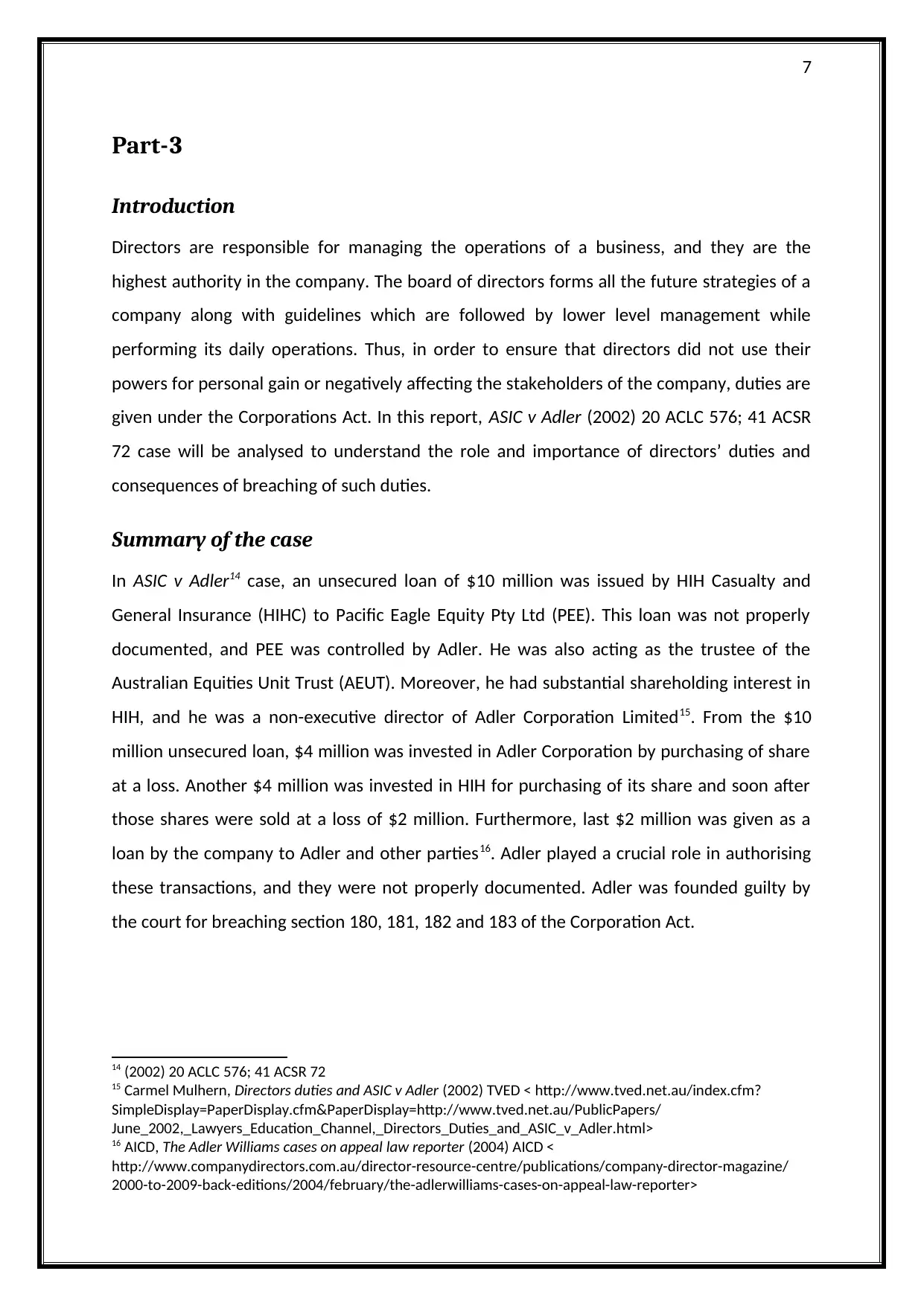
7
Part-3
Introduction
Directors are responsible for managing the operations of a business, and they are the
highest authority in the company. The board of directors forms all the future strategies of a
company along with guidelines which are followed by lower level management while
performing its daily operations. Thus, in order to ensure that directors did not use their
powers for personal gain or negatively affecting the stakeholders of the company, duties are
given under the Corporations Act. In this report, ASIC v Adler (2002) 20 ACLC 576; 41 ACSR
72 case will be analysed to understand the role and importance of directors’ duties and
consequences of breaching of such duties.
Summary of the case
In ASIC v Adler14 case, an unsecured loan of $10 million was issued by HIH Casualty and
General Insurance (HIHC) to Pacific Eagle Equity Pty Ltd (PEE). This loan was not properly
documented, and PEE was controlled by Adler. He was also acting as the trustee of the
Australian Equities Unit Trust (AEUT). Moreover, he had substantial shareholding interest in
HIH, and he was a non-executive director of Adler Corporation Limited15. From the $10
million unsecured loan, $4 million was invested in Adler Corporation by purchasing of share
at a loss. Another $4 million was invested in HIH for purchasing of its share and soon after
those shares were sold at a loss of $2 million. Furthermore, last $2 million was given as a
loan by the company to Adler and other parties16. Adler played a crucial role in authorising
these transactions, and they were not properly documented. Adler was founded guilty by
the court for breaching section 180, 181, 182 and 183 of the Corporation Act.
14 (2002) 20 ACLC 576; 41 ACSR 72
15 Carmel Mulhern, Directors duties and ASIC v Adler (2002) TVED < http://www.tved.net.au/index.cfm?
SimpleDisplay=PaperDisplay.cfm&PaperDisplay=http://www.tved.net.au/PublicPapers/
June_2002,_Lawyers_Education_Channel,_Directors_Duties_and_ASIC_v_Adler.html>
16 AICD, The Adler Williams cases on appeal law reporter (2004) AICD <
http://www.companydirectors.com.au/director-resource-centre/publications/company-director-magazine/
2000-to-2009-back-editions/2004/february/the-adlerwilliams-cases-on-appeal-law-reporter>
Part-3
Introduction
Directors are responsible for managing the operations of a business, and they are the
highest authority in the company. The board of directors forms all the future strategies of a
company along with guidelines which are followed by lower level management while
performing its daily operations. Thus, in order to ensure that directors did not use their
powers for personal gain or negatively affecting the stakeholders of the company, duties are
given under the Corporations Act. In this report, ASIC v Adler (2002) 20 ACLC 576; 41 ACSR
72 case will be analysed to understand the role and importance of directors’ duties and
consequences of breaching of such duties.
Summary of the case
In ASIC v Adler14 case, an unsecured loan of $10 million was issued by HIH Casualty and
General Insurance (HIHC) to Pacific Eagle Equity Pty Ltd (PEE). This loan was not properly
documented, and PEE was controlled by Adler. He was also acting as the trustee of the
Australian Equities Unit Trust (AEUT). Moreover, he had substantial shareholding interest in
HIH, and he was a non-executive director of Adler Corporation Limited15. From the $10
million unsecured loan, $4 million was invested in Adler Corporation by purchasing of share
at a loss. Another $4 million was invested in HIH for purchasing of its share and soon after
those shares were sold at a loss of $2 million. Furthermore, last $2 million was given as a
loan by the company to Adler and other parties16. Adler played a crucial role in authorising
these transactions, and they were not properly documented. Adler was founded guilty by
the court for breaching section 180, 181, 182 and 183 of the Corporation Act.
14 (2002) 20 ACLC 576; 41 ACSR 72
15 Carmel Mulhern, Directors duties and ASIC v Adler (2002) TVED < http://www.tved.net.au/index.cfm?
SimpleDisplay=PaperDisplay.cfm&PaperDisplay=http://www.tved.net.au/PublicPapers/
June_2002,_Lawyers_Education_Channel,_Directors_Duties_and_ASIC_v_Adler.html>
16 AICD, The Adler Williams cases on appeal law reporter (2004) AICD <
http://www.companydirectors.com.au/director-resource-centre/publications/company-director-magazine/
2000-to-2009-back-editions/2004/february/the-adlerwilliams-cases-on-appeal-law-reporter>
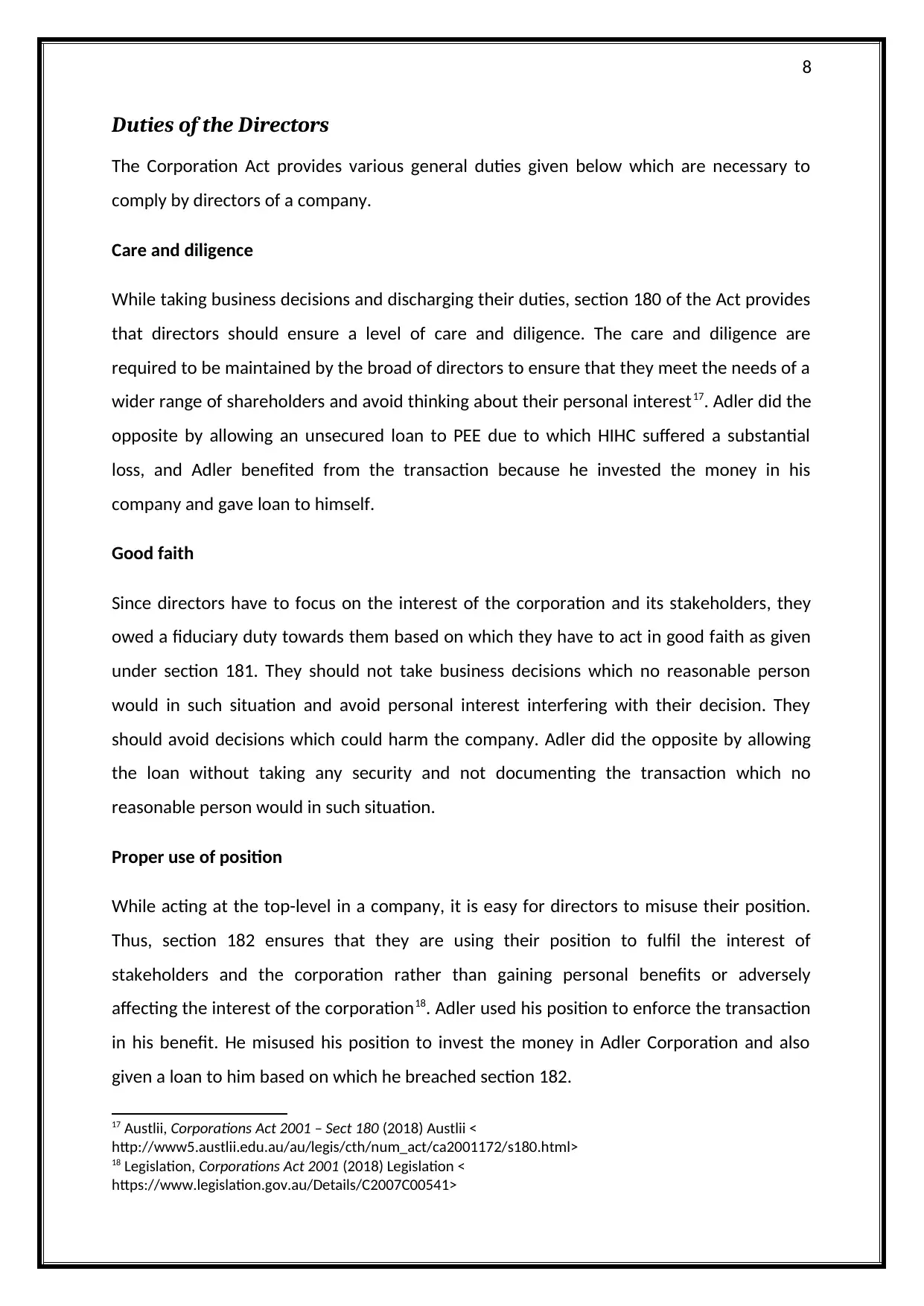
8
Duties of the Directors
The Corporation Act provides various general duties given below which are necessary to
comply by directors of a company.
Care and diligence
While taking business decisions and discharging their duties, section 180 of the Act provides
that directors should ensure a level of care and diligence. The care and diligence are
required to be maintained by the broad of directors to ensure that they meet the needs of a
wider range of shareholders and avoid thinking about their personal interest17. Adler did the
opposite by allowing an unsecured loan to PEE due to which HIHC suffered a substantial
loss, and Adler benefited from the transaction because he invested the money in his
company and gave loan to himself.
Good faith
Since directors have to focus on the interest of the corporation and its stakeholders, they
owed a fiduciary duty towards them based on which they have to act in good faith as given
under section 181. They should not take business decisions which no reasonable person
would in such situation and avoid personal interest interfering with their decision. They
should avoid decisions which could harm the company. Adler did the opposite by allowing
the loan without taking any security and not documenting the transaction which no
reasonable person would in such situation.
Proper use of position
While acting at the top-level in a company, it is easy for directors to misuse their position.
Thus, section 182 ensures that they are using their position to fulfil the interest of
stakeholders and the corporation rather than gaining personal benefits or adversely
affecting the interest of the corporation18. Adler used his position to enforce the transaction
in his benefit. He misused his position to invest the money in Adler Corporation and also
given a loan to him based on which he breached section 182.
17 Austlii, Corporations Act 2001 – Sect 180 (2018) Austlii <
http://www5.austlii.edu.au/au/legis/cth/num_act/ca2001172/s180.html>
18 Legislation, Corporations Act 2001 (2018) Legislation <
https://www.legislation.gov.au/Details/C2007C00541>
Duties of the Directors
The Corporation Act provides various general duties given below which are necessary to
comply by directors of a company.
Care and diligence
While taking business decisions and discharging their duties, section 180 of the Act provides
that directors should ensure a level of care and diligence. The care and diligence are
required to be maintained by the broad of directors to ensure that they meet the needs of a
wider range of shareholders and avoid thinking about their personal interest17. Adler did the
opposite by allowing an unsecured loan to PEE due to which HIHC suffered a substantial
loss, and Adler benefited from the transaction because he invested the money in his
company and gave loan to himself.
Good faith
Since directors have to focus on the interest of the corporation and its stakeholders, they
owed a fiduciary duty towards them based on which they have to act in good faith as given
under section 181. They should not take business decisions which no reasonable person
would in such situation and avoid personal interest interfering with their decision. They
should avoid decisions which could harm the company. Adler did the opposite by allowing
the loan without taking any security and not documenting the transaction which no
reasonable person would in such situation.
Proper use of position
While acting at the top-level in a company, it is easy for directors to misuse their position.
Thus, section 182 ensures that they are using their position to fulfil the interest of
stakeholders and the corporation rather than gaining personal benefits or adversely
affecting the interest of the corporation18. Adler used his position to enforce the transaction
in his benefit. He misused his position to invest the money in Adler Corporation and also
given a loan to him based on which he breached section 182.
17 Austlii, Corporations Act 2001 – Sect 180 (2018) Austlii <
http://www5.austlii.edu.au/au/legis/cth/num_act/ca2001172/s180.html>
18 Legislation, Corporations Act 2001 (2018) Legislation <
https://www.legislation.gov.au/Details/C2007C00541>
⊘ This is a preview!⊘
Do you want full access?
Subscribe today to unlock all pages.

Trusted by 1+ million students worldwide
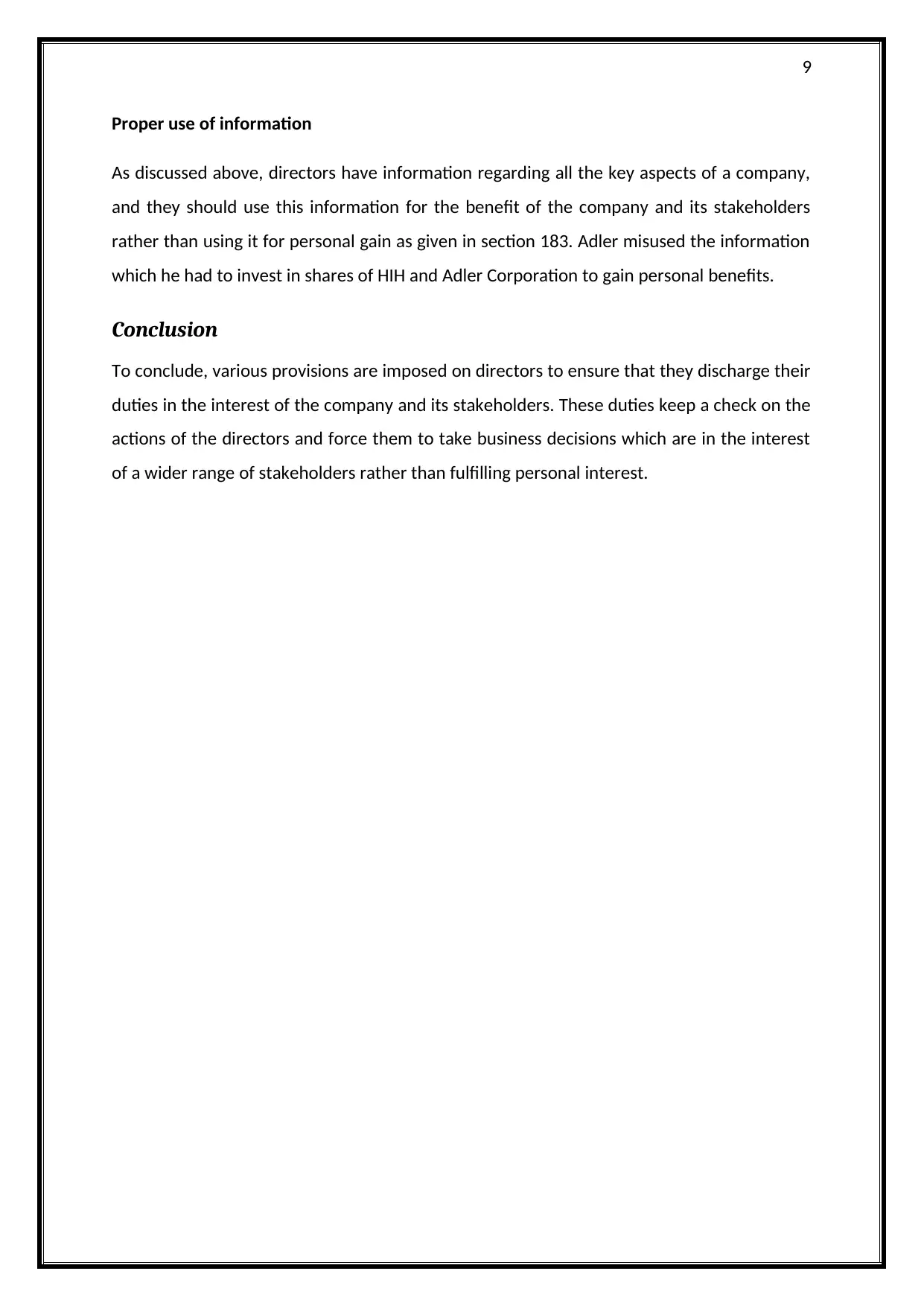
9
Proper use of information
As discussed above, directors have information regarding all the key aspects of a company,
and they should use this information for the benefit of the company and its stakeholders
rather than using it for personal gain as given in section 183. Adler misused the information
which he had to invest in shares of HIH and Adler Corporation to gain personal benefits.
Conclusion
To conclude, various provisions are imposed on directors to ensure that they discharge their
duties in the interest of the company and its stakeholders. These duties keep a check on the
actions of the directors and force them to take business decisions which are in the interest
of a wider range of stakeholders rather than fulfilling personal interest.
Proper use of information
As discussed above, directors have information regarding all the key aspects of a company,
and they should use this information for the benefit of the company and its stakeholders
rather than using it for personal gain as given in section 183. Adler misused the information
which he had to invest in shares of HIH and Adler Corporation to gain personal benefits.
Conclusion
To conclude, various provisions are imposed on directors to ensure that they discharge their
duties in the interest of the company and its stakeholders. These duties keep a check on the
actions of the directors and force them to take business decisions which are in the interest
of a wider range of stakeholders rather than fulfilling personal interest.
Paraphrase This Document
Need a fresh take? Get an instant paraphrase of this document with our AI Paraphraser
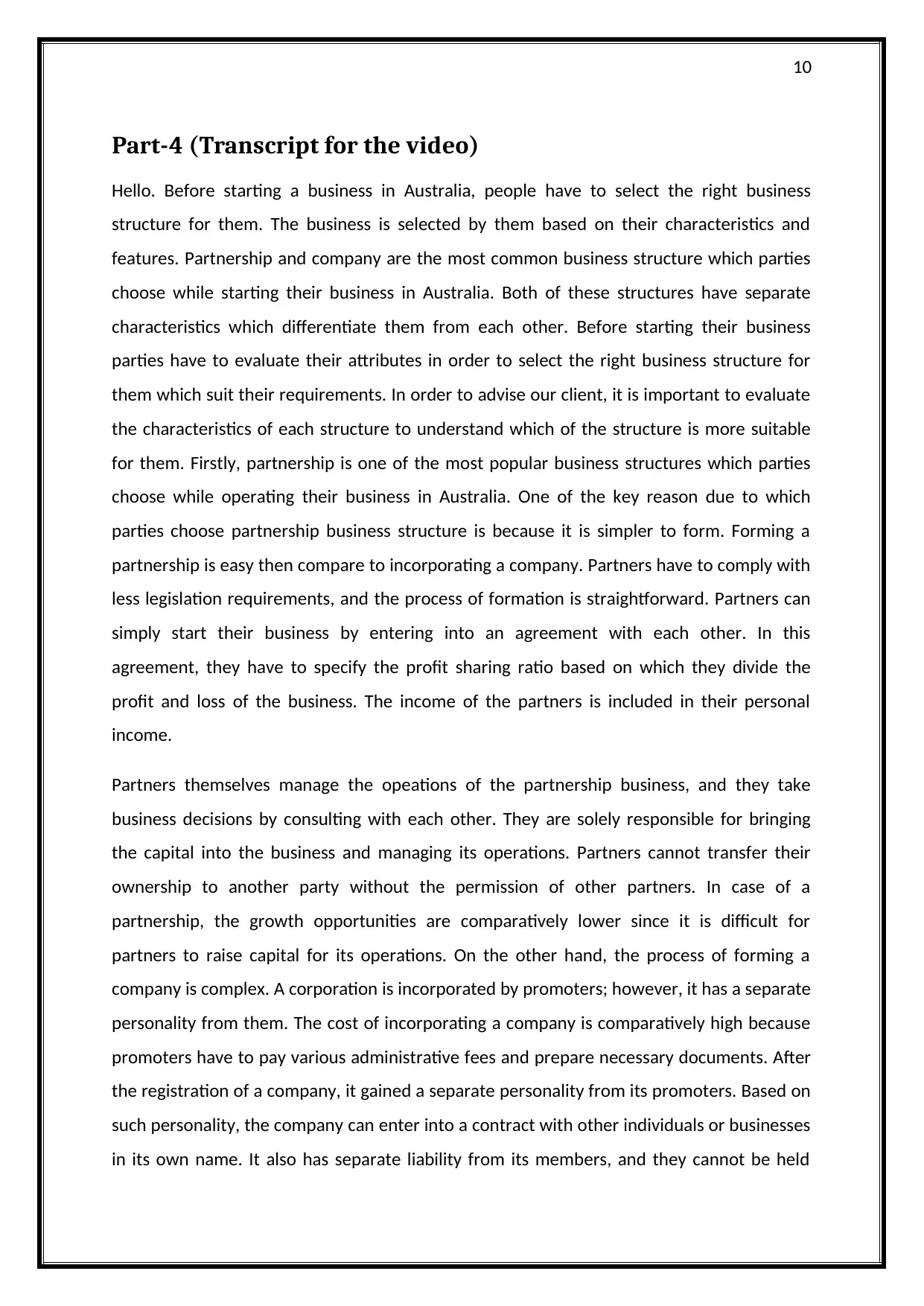
10
Part-4 (Transcript for the video)
Hello. Before starting a business in Australia, people have to select the right business
structure for them. The business is selected by them based on their characteristics and
features. Partnership and company are the most common business structure which parties
choose while starting their business in Australia. Both of these structures have separate
characteristics which differentiate them from each other. Before starting their business
parties have to evaluate their attributes in order to select the right business structure for
them which suit their requirements. In order to advise our client, it is important to evaluate
the characteristics of each structure to understand which of the structure is more suitable
for them. Firstly, partnership is one of the most popular business structures which parties
choose while operating their business in Australia. One of the key reason due to which
parties choose partnership business structure is because it is simpler to form. Forming a
partnership is easy then compare to incorporating a company. Partners have to comply with
less legislation requirements, and the process of formation is straightforward. Partners can
simply start their business by entering into an agreement with each other. In this
agreement, they have to specify the profit sharing ratio based on which they divide the
profit and loss of the business. The income of the partners is included in their personal
income.
Partners themselves manage the opeations of the partnership business, and they take
business decisions by consulting with each other. They are solely responsible for bringing
the capital into the business and managing its operations. Partners cannot transfer their
ownership to another party without the permission of other partners. In case of a
partnership, the growth opportunities are comparatively lower since it is difficult for
partners to raise capital for its operations. On the other hand, the process of forming a
company is complex. A corporation is incorporated by promoters; however, it has a separate
personality from them. The cost of incorporating a company is comparatively high because
promoters have to pay various administrative fees and prepare necessary documents. After
the registration of a company, it gained a separate personality from its promoters. Based on
such personality, the company can enter into a contract with other individuals or businesses
in its own name. It also has separate liability from its members, and they cannot be held
Part-4 (Transcript for the video)
Hello. Before starting a business in Australia, people have to select the right business
structure for them. The business is selected by them based on their characteristics and
features. Partnership and company are the most common business structure which parties
choose while starting their business in Australia. Both of these structures have separate
characteristics which differentiate them from each other. Before starting their business
parties have to evaluate their attributes in order to select the right business structure for
them which suit their requirements. In order to advise our client, it is important to evaluate
the characteristics of each structure to understand which of the structure is more suitable
for them. Firstly, partnership is one of the most popular business structures which parties
choose while operating their business in Australia. One of the key reason due to which
parties choose partnership business structure is because it is simpler to form. Forming a
partnership is easy then compare to incorporating a company. Partners have to comply with
less legislation requirements, and the process of formation is straightforward. Partners can
simply start their business by entering into an agreement with each other. In this
agreement, they have to specify the profit sharing ratio based on which they divide the
profit and loss of the business. The income of the partners is included in their personal
income.
Partners themselves manage the opeations of the partnership business, and they take
business decisions by consulting with each other. They are solely responsible for bringing
the capital into the business and managing its operations. Partners cannot transfer their
ownership to another party without the permission of other partners. In case of a
partnership, the growth opportunities are comparatively lower since it is difficult for
partners to raise capital for its operations. On the other hand, the process of forming a
company is complex. A corporation is incorporated by promoters; however, it has a separate
personality from them. The cost of incorporating a company is comparatively high because
promoters have to pay various administrative fees and prepare necessary documents. After
the registration of a company, it gained a separate personality from its promoters. Based on
such personality, the company can enter into a contract with other individuals or businesses
in its own name. It also has separate liability from its members, and they cannot be held
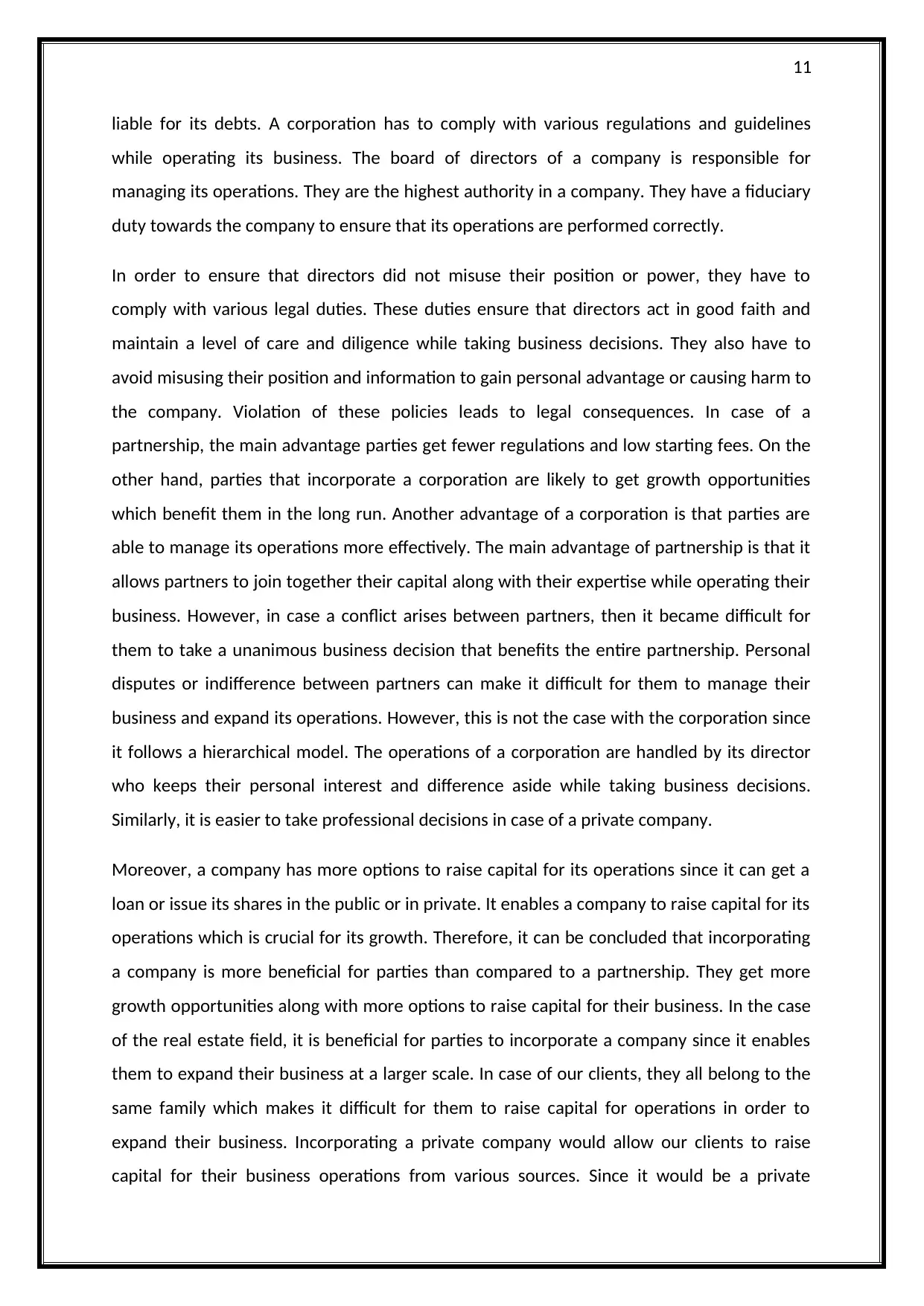
11
liable for its debts. A corporation has to comply with various regulations and guidelines
while operating its business. The board of directors of a company is responsible for
managing its operations. They are the highest authority in a company. They have a fiduciary
duty towards the company to ensure that its operations are performed correctly.
In order to ensure that directors did not misuse their position or power, they have to
comply with various legal duties. These duties ensure that directors act in good faith and
maintain a level of care and diligence while taking business decisions. They also have to
avoid misusing their position and information to gain personal advantage or causing harm to
the company. Violation of these policies leads to legal consequences. In case of a
partnership, the main advantage parties get fewer regulations and low starting fees. On the
other hand, parties that incorporate a corporation are likely to get growth opportunities
which benefit them in the long run. Another advantage of a corporation is that parties are
able to manage its operations more effectively. The main advantage of partnership is that it
allows partners to join together their capital along with their expertise while operating their
business. However, in case a conflict arises between partners, then it became difficult for
them to take a unanimous business decision that benefits the entire partnership. Personal
disputes or indifference between partners can make it difficult for them to manage their
business and expand its operations. However, this is not the case with the corporation since
it follows a hierarchical model. The operations of a corporation are handled by its director
who keeps their personal interest and difference aside while taking business decisions.
Similarly, it is easier to take professional decisions in case of a private company.
Moreover, a company has more options to raise capital for its operations since it can get a
loan or issue its shares in the public or in private. It enables a company to raise capital for its
operations which is crucial for its growth. Therefore, it can be concluded that incorporating
a company is more beneficial for parties than compared to a partnership. They get more
growth opportunities along with more options to raise capital for their business. In the case
of the real estate field, it is beneficial for parties to incorporate a company since it enables
them to expand their business at a larger scale. In case of our clients, they all belong to the
same family which makes it difficult for them to raise capital for operations in order to
expand their business. Incorporating a private company would allow our clients to raise
capital for their business operations from various sources. Since it would be a private
liable for its debts. A corporation has to comply with various regulations and guidelines
while operating its business. The board of directors of a company is responsible for
managing its operations. They are the highest authority in a company. They have a fiduciary
duty towards the company to ensure that its operations are performed correctly.
In order to ensure that directors did not misuse their position or power, they have to
comply with various legal duties. These duties ensure that directors act in good faith and
maintain a level of care and diligence while taking business decisions. They also have to
avoid misusing their position and information to gain personal advantage or causing harm to
the company. Violation of these policies leads to legal consequences. In case of a
partnership, the main advantage parties get fewer regulations and low starting fees. On the
other hand, parties that incorporate a corporation are likely to get growth opportunities
which benefit them in the long run. Another advantage of a corporation is that parties are
able to manage its operations more effectively. The main advantage of partnership is that it
allows partners to join together their capital along with their expertise while operating their
business. However, in case a conflict arises between partners, then it became difficult for
them to take a unanimous business decision that benefits the entire partnership. Personal
disputes or indifference between partners can make it difficult for them to manage their
business and expand its operations. However, this is not the case with the corporation since
it follows a hierarchical model. The operations of a corporation are handled by its director
who keeps their personal interest and difference aside while taking business decisions.
Similarly, it is easier to take professional decisions in case of a private company.
Moreover, a company has more options to raise capital for its operations since it can get a
loan or issue its shares in the public or in private. It enables a company to raise capital for its
operations which is crucial for its growth. Therefore, it can be concluded that incorporating
a company is more beneficial for parties than compared to a partnership. They get more
growth opportunities along with more options to raise capital for their business. In the case
of the real estate field, it is beneficial for parties to incorporate a company since it enables
them to expand their business at a larger scale. In case of our clients, they all belong to the
same family which makes it difficult for them to raise capital for operations in order to
expand their business. Incorporating a private company would allow our clients to raise
capital for their business operations from various sources. Since it would be a private
⊘ This is a preview!⊘
Do you want full access?
Subscribe today to unlock all pages.

Trusted by 1+ million students worldwide
1 out of 13
Related Documents
Your All-in-One AI-Powered Toolkit for Academic Success.
+13062052269
info@desklib.com
Available 24*7 on WhatsApp / Email
![[object Object]](/_next/static/media/star-bottom.7253800d.svg)
Unlock your academic potential
Copyright © 2020–2026 A2Z Services. All Rights Reserved. Developed and managed by ZUCOL.





